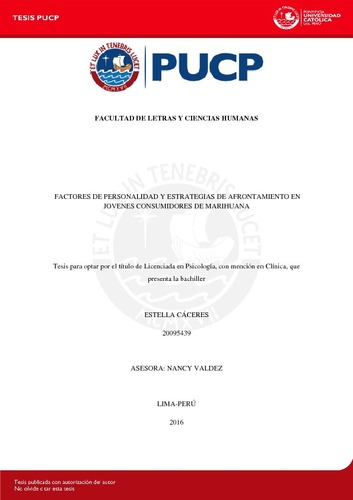| dc.contributor.advisor | Valdez Huarcaya, Nancy Eufemia | es_ES |
| dc.contributor.author | Cáceres Cebrecos, Estella María | es_ES |
| dc.date.accessioned | 2016-08-04T15:01:58Z | es_ES |
| dc.date.available | 2016-08-04T15:01:58Z | es_ES |
| dc.date.created | 2016 | es_ES |
| dc.date.issued | 2016-08-04 | es_ES |
| dc.identifier.uri | http://hdl.handle.net/20.500.12404/7165 | |
| dc.description.abstract | El objetivo de esta investigación es analizar la relación entre los factores de personalidad y las estrategias de afrontamiento en jóvenes consumidores de marihuana. Se utilizó el Inventario de personalidad NEO-FFI, versión reducida del NEO PI R de Costa y McCrae (1999) y el Cuestionario de Estilos de Afrontamiento (COPE) de Carver, Scheier y Weintraub (1989). La muestra estuvo compuesta por 41 hombres y 10 mujeres, entre 13 y 23 años de edad, que solicitaron consulta por consumo de marihuana en un programa ambulatorio de motivación y consejería en adicciones de Lima Metropolitana. Los índices de confiabilidad del NEOFFI fueron bajos, por lo que se neutralizaron los ítems correspondientes para incrementar la confiabilidad; sin embargo, la escala de Apertura mantuvo un índice bajo de confiabilidad. Se encontraron puntajes más altos en Conciencia y Extraversión. Las estrategias de afrontamiento más usadas fueron la planificación y aceptación, y en último lugar, el afrontamiento activo y la supresión de actividades en competencia. Se hallaron relaciones entre las estrategias de contención, uso de humor, liberar emociones, uso de alcohol y drogas, desentendimiento mental y conductual, soporte instrumental y negación y los cuatro factores de personalidad. La variable sociodemográfica edad se relacionó directamente con el uso de la aceptación, y el número de intentos por dejar el consumo correlacionó con una menor búsqueda de soporte social; además, los jóvenes que suspendieron el consumo al menos una vez usaron más el soporte instrumental y emocional que quienes nunca lo hicieron. El uso de la planificación, aceptación y soporte emocional e instrumental, así como puntajes menores de Neuroticismo y mayores de Conciencia se relacionan a patrones de consumo de marihuana menos problemáticos, aspecto que cobra relevancia para la comprensión e intervención en jóvenes consumidores de marihuana. | es_ES |
| dc.description.abstract | This investigation intended to study the relationship between personality factors and coping strategies used by young cannabis users, using the NEO-FFI Personality Inventory (Costa & McCrae, 1999) and the COPE’s Coping Styles Scale (Carver, Scheier & Weintraub, 1989). The sample comprised of 41 men and 10 women, between the ages of 13 and 23 (M= 17, DE=2.76) who seeked counsel at an addiction ambulatory motivation and counselling centre in Lima. Reliability results for the NEOFFI were low, leading to the neutralisation of the most troublesome items. Openness results were not reliable. Participants rated highest in Conscientiousness and Extraversion. Coping strategies most used were planning and acceptance, while active coping was the least utilized. Relationships between four personality traits and restraint, humor, venting of emotions, substance use, behavioral and mental disengagement, use of emotional social support and denial, as well as a positive relation between age and use of acceptance. Finally, as the numbers of attempts to stop smoking increased, so did the use of substances, emotional social support lessened, and the use of this final strategy varied according to the number of times of smoking cessation. The use of planning, acceptance and emotional social support, as well as lower levels of Neuroticism and higher scores in Conscientiousness, relate to healthier patterns of marijuana use, and therefore are aspects to be considered for understanding and treating young marijuana consumers. | es_ES |
| dc.language.iso | spa | es_ES |
| dc.publisher | Pontificia Universidad Católica del Perú | es_ES |
| dc.rights | Atribución-NoComercial-SinDerivadas 2.5 Perú | * |
| dc.rights | info:eu-repo/semantics/openAccess | es_ES |
| dc.rights.uri | http://creativecommons.org/licenses/by-nc-nd/2.5/pe/ | * |
| dc.subject | Personalidad. | es_ES |
| dc.subject | Adaptación (Psicología) | es_ES |
| dc.subject | Marihuana--Consumo. | es_ES |
| dc.title | Factores de personalidad y estrategias de afrontamiento en jóvenes consumidores de marihuana | es_ES |
| dc.type | info:eu-repo/semantics/bachelorThesis | es_ES |
| thesis.degree.name | Licenciado en Psicología Clínica | es_ES |
| thesis.degree.level | Título Profesional | es_ES |
| thesis.degree.grantor | Pontificia Universidad Católica del Perú. Facultad de Letras y Ciencias Humanas. | es_ES |
| thesis.degree.discipline | Psicología Clínica | es_ES |
| renati.discipline | 313026 | es_ES |
| renati.level | https://purl.org/pe-repo/renati/level#tituloProfesional | es_ES |
| renati.type | http://purl.org/pe-repo/renati/type#tesis | es_ES |
| dc.publisher.country | PE | es_ES |
| dc.subject.ocde | https://purl.org/pe-repo/ocde/ford#5.01.00 | es_ES |






